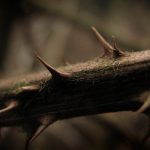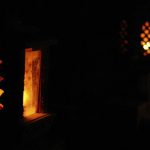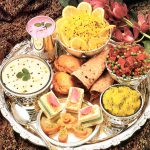by Srila Rupa Goswami
On the day before Janmastami (ie the saptami) one should build the snana vedi (altar on which the deity will be bathed) in the courtyard, to the accompaniment of devotional songs and instrumental music.
One should then have some holes dug at the four corners of the mandapa area and place in the holes banana trunks. The area should be surrounded seven times with red string and covered with a newly painted canopy.
In the four directions one should then plant poles with flags on them and place there all sorts of auspicious items, such as durba, kusa, lamps, nima fruit, mustard seeds and a svastika (made of raw rice mixed with kumkum). Over the doors strings of leaves should be hung.
(According to Hayasirsa Pancaratra the flags in the eight irections should be colored as follows:
east:red
south east:fiery
south:black
south west:white
west:yellow
north west:coppery red
north:white
north east:multicolored
In the early morning of the astami, groups of devotees, to the accompaniment of singing, dancing and instumental music, should complete the decoration of the vedi with lamps, auspicious pots etc.
One should perform all the purvanga karmas such as suchi, nyasa, etc for the purification of the body, mind, place and materials. (see puja manual)
Having completed the construction and decoration of the mandapa (pavilion) and the vedi (altar), and having purified the place acording to the rules of puja, one should then bring the Lord onto the vedi while waving camaras and sheltering him with an umbrella. Svasti Vacana (Invocation of Auspiciousness):
One should recite:
punantu ma devajanah punantu manasa diyah
punantu visva bhutani jatavedah punihi mam
One brahmana should say:
asya karmana punyaham bhavanto bruvantu
Three (or the rest) brahmanas should throw rice from their right hands saying:
om punyaham om punyaham om punyaham
udgateva sakune sama gayasi
brahma putra iva savanesu samsasi
vrseva vaji sisu matir apitya
sarvato nah sakune bhadrama vada
visvato nah sakune punyama vada
A brahmana should say:
asya karmana svasti bhavanto bruvantu ayusmate svasti
Three (or the rest) brahmanas should throw rice from their right hands saying:
om svasti om svasti om svasti
svasti na indro vrddha sravah
svasti nah pusa visva vedah
svasti nah tarksyo aristanemih
svasti no brhaspatir dadhatu
A brahmana should say:
asya karmano rddhim bhavanto bruvantu
Three (or the rest) brahmanas should throw rice from their right hands saying:
om rdhyatam om rdhyatam om rdhyatam
rdhyama stomam sanuyama vaja
ma no mantra sarathehopa yatan
yaso na pakkam madhu gosvanta
ra bhutamso asvinoh kamam aprah
Dig Bandhana (Binding the Directions):
One should then perform dig bandhana, or protecting oneself in all ten directions by throwing white mustard seeds in the directions starting from the east, going clockwise, while saying:
(east) pracyai dise svaha
(southeast) arvacyai dise svaha
(south) daksinayai dise svaha
(southwest) arvacyai dise svaha
(west) praticyai dise svaha
(northwest) arvacyai dise svaha
(north) udicyai dise svaha
(northeast) arvacyai dise svaha
(upwards) urdhvayai dise svaha
(downwards) arvacyai dise svaha
disah pradisa adiso vidisa uddiso digbhyah svaha
apasarpantu te bhuta ye bhuta bhuvi samsthitah
ye bhuta vighnakartaras te nasyantu sivajnaya
Ghata Sthapana (Establishing the pot):
One should then perform ghat stapana, establishing the pot beside the central vedi. Touching the earth one should say:
bhur asi bhmir asy aditir asi
visvadhaya visvasya bhuvanasya dhatri
prthivim yaccha prthivim drmha prthivim ma himsih
Touching rice paddy one should say:
dhanyam asi dhinuhi devan
pranaya tvodanaya tva vyanaya tva
dirghamanu prasitim ayuse dham
devo vah savita hiranyapanih
pratigrbhnatv acchidrena panina
caksuse tva mahinam payo’si
Placing the pot on the rice paddy one should say:
ajighra kalasam mahya tva visantv indavah
punarurja nivartasva sa nah sahasram dhuksvorudhara
payasvati punarmavi satadrayih
Pouring water into the pot one should say:
varunasyottanbhanam asi
varunasya skambhasarjani stho
varunasya rta sadany asi
varunasya rta sadanam asi
varunasya rta sadanam asida
One should place five leaves on the pot saying:
asvathe vo nisadanam parne vo vasatih krta
gobhaja it kilasatha yat sanavatha purusam
One should place a coconut or banana on top saying:
yah phalinir ya aphala apuspa yas ca puspinih
brhaspatiprasutas ta no muncantv amhasah
One should place flowers on the pot saying:
shris ca te laksmis ca patnyavahoratre
parsve naksatrani rupam asvinau vyattam
isnann isanamum ma isana sarvalokam ma isana
One should worship Ganesa in the pot saying:
gananam tva ganapati’gum havamahe
priyanam tva priyapati’gum havamahe nidhinam tva nidhipati’gum havamahe vaso mama
ahamajani garbhadhama tvam ajasi garbhadham
Sankalpa (Ceremonial Vow):
One should then perform sankalpa:
om visnu om tat sad
asya bhadre masi krsne pakse astamyam tithau acyuta gotrah
…… dasa (name of person) shri krishna priti kamah
shri krishnasya janma mahotsave
mahapuja purvaka mahabhisekam aham karisye
One should pray:
avatara sahasrani karosi madhusudana
na te sankyavataranam kascij janati vai bhuvi
deva brahmadayo vapi svarupam na vidus tava
atas tvam pujayisyami matur utsanga samsthitam
vanchitam kuru devesa duskrtam caiva nasaya
kurusva me dayam deva samsararti bhayapaha
Upacara Dana (offering the articles of puja):
One should offer each article saying the appropriate mantras: Asana (seat):
purusam evedam sarvam yad bhutam yac ca bhavyam
utamrtat vaseysano tad annenatirohati
om yajnesvaraya yajnaya sambhavaya yajnapataye
govindaya namo namah
idam asanam + mula mantra
Svagatam (welcome):
One should welcome the Lord:
tasya te paramesana svagatam svagatam bhavet
krtartho’nugrhito’smi sakalam jivitum tu me
yad agato’si devesa cidananda mayavyaya
svagatam su svagatam shri krishna + mula mantra
Padyam (footwash):
One should offer water mixed with millet, durba, and visnukranta herb.
etavan asya mahima ato jyayams ca purusah pado’sya visva bhutani tripadasyamrtam divi
om yajnesvaraya yajnaya sambhavaya yajnapataye
govindaya namo namah
etat padyam + mula mantra
Arghyam (offering of auspicious articles):
One should offer water mixed with sesame, mustard seeds, flowers, sandalwood paste, barley and kusa tips over the Lords head, (or hands) saying:
tripad urddhva udait purusah pado’syeha bhavat punah
tato visvan vyakramata sasananasane abhi
om yajnesvaraya yajnaya sambhavaya yajnapataye
govindaya namo namah
idam arghyam + mula mantra
Acamaniyam (mouthwash):
One should offer water, with nutmeg, cloves and kakkola to the Lord’s mouth, (three times) saying:
tato virad ajayata virajo adhi purusa
sa jato atyaricyata pascad bhumim atho purah
om yajnesvaraya yajnaya sambhavaya yajnapataye
govindaya namo namah
idam punar acamaniyam + mula mantra
Madhuparka (edible offering):
One should offer ghee, yoghurt and honey in proportions of 1:3:1 for the Lord to eat, saying:
om yajnesvaraya yajnaya sambhavaya yajnapataye
govindaya namo namah
esa madhuparka + mula mantra
Punar Acamaniyam (mouthwash):
One should offer acamana again to Lord’s mouth, saying:
tato virad ajayata virajo adhi purusa
sa jato atyaricyata pascad bhumim atho purah
om yajnesvaraya yajnaya sambhavaya yajnapataye
govindaya namo namah
idam punar acamaniyam + mula mantra
One should make a stiff dough from flour, sugar and water and fashion into receptacles for holding wicks and ghee (pista dipa).
One should wave the lamps before the Lord saying:
om hiranya garbhah samvartatagre
bhutasya jatah patir eka asit
sa dadhara prthivim dyam utemam
kasmi devaya havisa vidhema
ya atmad abalada yasa mrtyuh
upkasate prasisam yasya devah
yasya chayamrtam yasya mrtyuh
kasmai devaya havisa vidhema
ya pranito nimisato mahitvai
kaidraja jagato babhuva
ya ise asya dvipada catuspadah
kasmai devaya havisa vidhema]
yasyema himavanto mahitva
yasya samudra rsaya sanahuh
yasyemah pradiso yasya bahu
kasmai devaya havisa vidhema
yena dyaur ugra prithivi ca driha
yena svah stabhitamyena nakah
yo antarikse rajaso vimanah
kasmai devaya havisa vidhema
yam krandasi avasa tastabhane
abhyaiksetam manasa rejamane
yatra dhi sura udito vibhati
kasmai devaya havisa vidhema
apo ha tad brhatir visvamayan
garbham dadhana janayantir agnim
tato devanam samavartatasurekah
kasmai devaya havisa vidhema
yascid apo mahina paryapasyad
daksom dadhana janayanti yajnam
yo devesvadhi deva eka asit
kasmai devaya havisa vidhema
ma no himsij janita ya prthivya
yo va divam satyadharma jajana
yas capas candra brhatir jajana
kasmai devaya havisa vidhema
om yajnesvaraya yajnaya sambhavaya yajnapataye
govindaya namo namah
esa dipah + mula mantra
One should rub sesame powder on the Lord’s body saying:
murdhanam divo aratim prthivya
vaisvanaramrta a jatam agnim
kavim samrajam atithim jananam
asanna patra janayanta devah
om yajnesvaraya yajnaya sambhavaya yajnapataye
govindaya namo namah
idam tila udvartanam + mula mantra
Snana (bath):
One should bathe the Lord in water mixed with sesame seed paste, saying:
tilo’si soma devatyo
gosavo eva nirmitah
prayatnam adbhih prktah sudhaya
pustva pitrn lokan prnahi nah svaha
One should change the Lord’s cloth and bathe him again in pure water, saying:
varunasyottanbhanam asi
varunasya skambhasarjani stho
varunasya rta sadany asi
varunasya rta sadanam asi
varunasya rta sadanam asida
tat tva yami brahmana vandamanas
tada saste yajamano havirbhih
ahedamano varuneh bodhyu
rusamsa ma na ayuh pra moshih
varunah pravita bhuvan
mitro visvabhir utibhih
karatam nah suradhasah
om yajnesvaraya yajnaya sambhavaya yajnapataye
govindaya namo namah
idam snaniyam + mula mantra
Panca Gavya Snana:
Cow urine:
Om bhur bhuvah svah
tat savitur varenyam
bhargo devasya dhimahi
dhiyo yo nah pracodayat
Cow dung:
gandha dvaram duradharsam nitya pustam karisinim
isvarim sarva bhutanam tvam ihopa hvaye shriyam
Milk:
apyayasva sametu te visvatah soma vrsnyam
bhava vajasya samgathe
Yoghurt:
dadhi kravno akarisam jisnor asvasya varjinah
surabhi no mukha karat pranayu’gum si tarisat
Ghee:
tejo’si sukram asi amrta asi dhamanam asi
priyam devanam anadhrstam deva yajanam asi
Kusa water:
devasya tva savituh prasave
‘svino bahubhyam psrno hastabhyam
sarasvatyai vaco yantur yantirye dadhami
brhaspates tva samrajyenabhisincmi
anaye justam grhnami
agni somabyam justam grhnami
Pancamrta Snana:
Milk:
payah prthivyam paya osadisu
payo divy antarikse payo dhah
payasvatih pradisah santu mahyam
Yoghurt:
dadhi kravno akraisam jisnor asvasya vajinah
surabhi no mukha karat pra na ayumsi tarisat
Ghee:
ghrtam ghrtapavanah pibata
vasam vasapavanah pibata antariksasya havir asi svaha
disah pradisa adiso vidisa uddhiso digbhyah svaha
Honey:
madhu vata rtayate madhu ksaranti sindhavah
madhvir nah santvosadhih
madhu naktam utosaso mahdumat parthivam rajah
madhu dyaur astu nah pita
madhuman no vanaspati madhuma stu suryah
madhvir gavo bhavantu nah
Sugar:
apam rasam udvaya samsurye santam samahitam
apam rasasya yo rasa tam vo grhnamy uttamam
upayama grhito’ sindraya tva justam
grhnamy esa te yonir indraya tva justatamam
Usnodaka Snana (warm water bath):
One should bathe the Lord in warm water, saying:
sapta te agne samidhah sapta jihvah sapta rsayah
sapta dhama priyani
sapta hotrah saptadha tva yajanti sapta yonir
aprnasva grtena svaha
Sarvausadhi Snana (herbal bath):
One should bathe the Lord in water with mura, mamsi, vaca, kustham, saila, tumeric, daru haridra, sati, campaka and musta, saying:
ya osadhih purva jata devbhyas triyugam pura
manainu babhrunam aham satam dhamani sapta ca
Mahausadhi Snana (second herbal bath):
One should bathe the Lord in water mixed with sahadevi, vaca, vyaghri, bala, atibala, akhapuspa, simhi and suryavarta, saying:
ya osadhi somarajni vahvih sata vicaksanah
ta mahyam asinnasane’cchidrah sarma yachata
Mangala Snana (auspicious bath):
One should bathe the Lord in water mixed with auspicious elements.
sumangalir iyam vadhur imam sameta pasyata
saubhagyam asyai dattvaya’thas tam vi paretana
Bija-astaka Snana (eight-seed bath):
One should bathe the Lord in water mixed with eight seeds, barley, wheat, wild rice, sesame, millet, rice paddy, panic seed, and rice which grows in sixty days, saying: ?
Gandhodaka Snana (scented bath water):
One should bathe the Lord in water mixed with scents such as musk and aguru, over which has been chanted the savitri gayatri.
Gandha (sandalwood):
One should smear the Lord’s body with sandalwood pulp, saying:
drupadad iva mumucanah svinnah santomalad iva
putam pavirenavajyam apah suddhantu mainasah
om yajnesvaraya yajnaya sambhavaya yajnapataye
govindaya namo namah
esa gandhah + mula mantra
Candanodaka Snana (Sandalwood water):
One should bathe the Lord in water mixed with sandalwood paste, saying:
samudram gaccha svaha antariksa gaccha svaha
devam savitaram gaccha svaha mitra varunau gaccha svaha
ahoratre gaccha svaha chandamsi gaccha svaha
deva savitaram gaccha svaha yajnam gaccha svaha
somam gaccha svaha divyam nabho gaccha svaha
agnim vaisvanaram gaccha svaha
mano me hardi yaccha divam te dhumo gacchatu
svar jyotih prthivim bhasmanaprna svaha
Sahasra Dhara Snana (shower):
One should bathe the Lord with pure water showered from the sahasra dhara (pot with holes in the bottom), saying:
tam savitur varenyaysacitram
aham vrne sumatim visvajanyam
yamasya kanvo aduhat prapinam
sahasradharam payasa mahim gam
One should bathe the Lord with maha osadhi from the sahasra dhara, saying:
ya osadhih purva jata devabhyas triyuga pura
manai mu babhrunam aham satam dahmani sapta ca
One should bathe the Lord with gandhah water from the sahasra dhara, saying:
gandhah dvaram duradharsam nityapustam karisinam
isvarim sarva bhutanam tvam ihopa hvaye shriyam
One should bath the Lord with astaka bija water from the sahasra dhara, saying:
a brahman brahmano brahmavarcasi
jayatama rastre rajanyah sura
isvyo’tivyadhi mahratho jayatam
dogdhri dhenur bodhanadvanasuh
saptih purandhir yosa jisnu rathesthah
sabheyoyuvasya yajamansya viro jayatam
nikame nikame nah parjanyo varsatu
phalavatyo na osadhyah pacyantam
yogaksemo nah kalpatam
One should bathe the Lord in water mixed with flowers from the sahasra dhara, saying:
osadhdaya prati grbhnita puspavaith supippalah
ayam vo garbha rtviyah pratnam sadhastham asadat
One should bath the Lord in fruit water from the sahasra dhara, saying the same mantra as for the flower:
osadhdaya prati grbhnita puspavaith supippalah
ayam vo garbha rtviyah pratnam sadhastham asadat
One should bathe the Lord in jewel water from the sahdhara, saying:
asuh sisano vrsabho na bhimo
ghanaghanah ksobhanas carsaninam
sankrandano’nimisa ekavirah
satam sena ajayat sakam indrah
Kalasa Snana (Waterpot bath):
One should bathe the Lord in water from eight kalasas. One kalasa should hold approximately twelve kilograms (liters) of water. The kalasas should be unbroken with rounded bottoms and graceful neck.
One should bathe the Lord with the water, saying:
etonv indram stavama suddham suddhena amna
suddhadair uktair vavrddhamsam sudha asirvan mamattu
indrah suddha na a gahi suddhah suddhabhir utibhih
suddho rayim ni dharaya sudho mamaddhi somyah
indrah suddho hi no rayim suddho ratnani dasuse
suddho vrtrani jighnase suddho vajam sisasas
One should bathe the Lord in sixteen kalasas of tirtha water mixed with tulasi and sandalwood paste, saying the purusa sukta:
Purusa Suktam:
om sahasra sirsa purusah sahasraksah sahasrapat sa bhumim visvato vrtva’ atyatisthad dasangulam
om purusa evedam sarvam yad bhutam yac ca bhavyam utamrtatvasyesano yad annenatirohati
om etavan asya mahima ato jyayams ca purusah pado’sya visva bhutani tripad asyamrtam divi
om tripad urdhva udait purusah pado’syeha’bhavat punah tato visvan vyakramat sasananasane abhi
om tasmat virad ajayata virajo adhipurusah sa jato atyaricyata pascad bhumim atho purah
om yat purusena havisa deva yajnam atanvata vasanto asyasid ajyam grisma idhmah sarad dhavih om saptasyasan paridhayah trih sapta samidhah krtah deva yad yajnam tanvanah abadhnan purusam pasum
om tam yajnam barhisi prauksan purusam jatam agratah tena deva ayajanta sadhya rsayas ca ye
om tasmad yajnat sarva hutah sambhrtam prsad ajyam pasums tams cakre vayavyan aranyan gramyas ca ye
om tasmad yajnat sarva huta rcah samani jajnire chandamsi jajnire tasmat yajus tasmad ajayata om tasmad asva ayajanta ye ke cobhayadatah gavo ha jajnire tasmat tasmaj jata aja vayah
om yat purusam vyadadhuh katidha vyakalpayam mukham kim asya kau bahu ka uru padav ucyete om brahmo’sya mukham asit bahu rajanyah krtah uru tad asya yad vaisyah padbhyam sudro ajayata
om candrama manaso jatas caksoh suryo ajayata mukhad indras cagnis ca pranad vayur ajayata
om nabhya asid antariksam sirsno dyauh samavartata padbhyam bhumir disah srotrat atha lokam akalpayan
vedaham etam purusam mahantam
aditya varnam tamasas tu pare sarvani rupani vicitya dhirah namani krtvabhivadan yad aste
dhata purastad yam udajahara
sakrah pravidvan pradisas catasrah tam evam vidvan amrta iha bhavati nanyah pantha ayanaya vidyate
om yajenena yajnam ayajanta devas tani dharmani prathamany
asan te ha nakam mahimanah sacante yatra purve sadhyah santi devah
Vastram (cloth):
One should wipe the Lord and dry him and change his cloth. One should offer a pleasing dress to the Lord saying:
abhi vastra suvasananyarsa
‘bhih dhenuh sudughah puyamanah
abhi candra bhartave no hiranya
‘bhiyasvan rathino deva soma
om yajnesvaraya yajnaya sambhavaya yajnapataye
govindaya namo namah idam vastram + mula mantra
Yajnopavita (sacred thread):
One should offer a sacred thread to the Lord saying:
yajnopavitam paramam pavitram
prajapater yat sahajam purastat
ayusyam agryam pratimunca subhram
yajnopavitam balam astu tejah
om yajnesvaraya yajnaya sambhavaya yajnapataye
govindaya namo namah
idam yajnopavitam + mula mantra
Nirmancana (aratrika):
One should wave the herbs sahadeva, sadabhadra, suryavarta and kusa tips in circles before the Lord, saying:
kandat kandat prarohanti purusah parusas pari
eva no durve pratanu sahasrena satena ca
One should offer sirisa and tumeric in the same way with the same mantra.
Drsti Uttarana (deliverance from evil glances):
One should wave nima fruits, white and black mustard seeds and salt in front of the Lord to drive away inauspicious entities.
Matsya Mocana:
One should throw a silver fish into a pot of water.
Padyam (footwash):
om yajnesvaraya yajnaya sambhavaya yajnapataye
govindaya namo namah
etat padyam + mula mantra
Acamaniyam (mouthwash):
om yajnesvaraya yajnaya sambhavaya yajnapataye
govindaya namo namah
idam acamaniyam + mula mantra
Kalasa Drsti (viewing an auspicious pot):
One should present a pot filled with water and topped with leaves and a coconut to the Lord and place it before him along with a variety of fruits.
om yajnesvaraya yajnaya sambhavaya yajnapataye
govindaya namo namah
idam mangala kalasam + mula mantra
Netronmilanam (opening the eyes):
One should then bless the Lord’s eyes by touching them with a golden wand, saying:
tac caksur devahitam purastac chukram ucarat
pasyema saradah satam jivema saradah satam
srnuyama saradah satam prabravama saradah satam
adinah syama sarah satam bhuyas ca saradah satat
Anjana (ointment):
One should apply collyrium to the Lord’s eyes, saying:
anjate vyanjate samanjate
kratum rihanti madhunabhyanjate
sindhor ucchvase patayantam uksanam
hiranya pavah pasum asu grbhnate
om yajnesvaraya yajnaya sambhavaya yajnapataye
govindaya namo namah
idam anjanam + mula mantra
Tilaka:
One should aply rocana (yellow pigment made with cow urine) tilaka to the Lord’s forehead saying:
yunjanti bradhnam arusam carantam apri tasthusah
rocante rocana divi
om yajnesvaraya yajnaya sambhavaya yajnapataye
govindaya namo namah
esa tilakah + mula mantra
One’s mother or sister should then touch one hundred and eight blades of durba grass and puffs of raw cotton to the Lord’s head.
Homa (fire sacrifice):
On one’s birthday one should perform six acts using sesame. Thus on the Lord’s appearance day his body is rubbed with sesame, he is bathed in sesame water, and later he will be offered sesame foods.
One should also give gifts of sesame, sow sesame seeds and perform homa with sesame, using the deity mula mantra.
Puspa, Mala (flowers and garlands):
One should give the Lord flowers and garlands.
om yajnesvaraya yajnaya sambhavaya yajnapataye
govindaya namo namah
etani puspani + mula mantra
om yajnesvaraya yajnaya sambhavaya yajnapataye
govindaya namo namah
idam malyam + mula mantra
Pratisarah (wrist band):
One should bind the right wrist of the Lord with yellow thread saying:
dirghaytvaya balaya varcase suprajastvaya,
casas atho jiva saradah satam
om yajnesvaraya yajnaya sambhavaya yajnapataye
govindaya namo namah
esa pratisarah + mula mantra
Darpana (mirror):
One should offer a mirror to the Lord and let him look at his reflection.
pratipad asi pratipade tvanupady asi anupade tva
sampad asi sampade tva tejo’si tejase tva
om yajnesvaraya yajnaya sambhavaya yajnapataye
govindaya namo namah
esa darpanah + mula mantra
Ghrta Darsana:
One should show the auspicious element ghee to the Lord, saying:
ghrtavati bhuvananam abhi shriyor
vi prthivi madhu dughe supesasa
dyava prthivi varunasya dharmana
viskabhite ajare bhure retasa
om yajnesvaraya yajnaya sambhavaya yajnapataye
govindaya namo namah
idam ghrtam + mula mantra
Camara (Whisk):
One should wave the camara over the Lord saying:
vato va mano va gandharvah sapta vimsatih
te agre’svam ayunjams te asmin javam adadhuh
om yajnesvaraya yajnaya sambhavaya yajnapataye
govindaya namo namah
esa camara seva + mula mantra
Bhusana (ornaments):
One should decorate the Lord with ornaments saying:
hiranya purah sa hiranya samdrg
apam napat sedu hiranya varnah
hiranyayat pari yoner nisadya
hiranyada dadaty annam asmai
om yajnesvaraya yajnaya sambhavaya yajnapataye
govindaya namo namah
etany abharanani + mula mantra
Godana:
On the occasion of a birthday a cow may be given to a brahmana.
Vandapanam:
On an auspicious day one should worship auspicious items. One should bring forth the following items and say the appropriate mantra.
earth:
bhur asi
bhumirasy aditir asi
visvadhaya visvasya bhuvanasya dhatri
prthivim yaccha
prthivim drmha
prthivim ma himsih
gandha:
tvam gandhara akhanams
indras tvam brhaspatih
tvam osadhe samo raja
vidvan yaksmadam ucyata
stone:
pra parvatasya vrsabhasya prstha
navas caranti svasi ca iyanah
ta ava vrtrannadharag udakta
ahir budhnyam anu riyamanah
visnor vikramanam asi
visnor vikrantam asi
visnoh krantam asi
rice paddy:
dhanyam asi dhinuhi devan
pranaya tvodanaya tva vyanaya tva
dirgham anu prasitim ayuse dham
devo vah savita hiranyapanih
pratigrbhnatv acchidrena panina
caksuse tva mahinam payo’si
durba grass:
kandat kandat prarohanti
purusah parusaspari
eva no durve pratanu
sahasrena satena ca
flowers:
om shris ca te laksmis ca patnyav
aho ratre parsve naksatrani rupam
asvinau vyattam
isnannisanamum ma isana
sarvalokam ma
isana fruit:
yah phalini ya aphala
apuspa yasca puspinih
brhaspati prasutas
ta no muncantv amhasah
yoghurt:
dadhikravno akarisam
jisnor asvasya vajinah
subabhi no mukha karat
pra na ayumsi tarisat
ghee:
ghrtavati bhuvananam
abhishriyor vi prthvim
madhudughe supesasa
dyava prthivi varunasya
dharmana viskabhite
ajare bhuri retasa
svastikam:
svasti na indro vrddha sravah
svasti nah pusa visvavedah
svasti nas tarksyo aristanemih
svasti no brhaspatir dadhatu
sindhur (vermilion):
sindhor iva pradhvane sughanaso
vatapramiyah patayanti yahvah
ghrtasya dhara aruso na vaji
kastha bhindann urmibhih pinvamanah
conch:
agnir rsih pavamanah
pancajanyah purohitah
tamimahe mahagayam
kajjala (collyrium):
samiddho anjan krdaram matinam
ghrtam agne madhumat pinvamanah
vaji vahanvajinam jatavedo
devanam vaksi priyama sadhastham
rocana:
yunjanti bradhnam arusam carantam pari tasthusah rocante rocana divi
gold:
hiranyarupah sa hiranyasamdrg
apam napat sedu hiranyavarnah
hiranyayat pari yoner nisadya
hiranyada dadaty annam asmai
silver:
rupena vo rupam abhyagam
tutho vo visvaveda vibhajatu
rtasya patha preta candra
daksina visvah pasya
vyantariksam yatasva sadasyaih
copper:
asau yas tamro aruna
uta babhruh sumangalah
ye cainam rudra abhito diksu
shritah sahasraso’vaisam heda imahe
white mustard seed:
raksohanam balagahanam vaisnavim idam
aham tam balagam utkirami
yam me nistyo yam amatyo nicakhanedam
aham tam balagam utkirami
yam me savandhur yam asavandhur nicakhanedam
aham tam balagam utkirami
yam me sajato yam asajato
nicakhanotkrtyam kirami
mirror:
pratipad asi pratipade
tvanupadasy anupade tva
sampadasi sampade tva
tejo’si tejase tva
lamp:
shriye jatah shriya a niriyaya
shriyam vayo jaritrbho dadhatu
shriyam vasana amrta tvam ayan
bhavantu satya samitha mitadrau
One should then place all the items on a beautiful plate, and holding the plate with one’s two hands offer it three times in aratrika fashion to the Lord, saying:
svasti na indro vrddha sravah
svasti nah pusa visvavedah
svasti nas tarksyo aristanemih
svasti no brhaspatir dadhatu
and:
mahi gandhah sila dhanyam durba puspam phalam dadhi
grtam svastika sinduram sankha kajjala rocanah
siddhannam kanacanam raupyam tamram siddhartha darpanau
dipah prasasta patram ca vandaniyah subhe dine
Samskaras:
The samskaras ending with upanayanam (giving the sacred thread may then be performed for the Lord. The performers of the rites should be worshipped by giving cloth, garlands etc.
Dhupa (incense):
One should offer incense to the Lord, saying:
dhurasi dhrva dhurvantam
dhruva tam yo’sman dhurati tam dhurva ya vayam dhurvamah
devanam asi vahnitamam sasnitamam
papritamam justatamam devahutamam
om yajnesvaraya yajnaya sambhavaya yajnapataye
govindaya namo namah
esa dhupah + mula mantra
Dipa (lamps):
One should offer lamps saying:
agnir jyotir jyotir agnih svaha
suryo jyotir jyotir suryah svaha
agnir varco jyotir varcah svaha
suryo varco jyotir varcah svaha
jyotir surya suryo jyotih svaha
om yajnesvaraya yajnaya sambhavaya yajnapataye
govindaya namo namah
esa dipah + mula mantra
Naivadyam (food):
One should then offer nice foodstuffs, such as sesame laddus, popped rice, rice boiled in milk and sugar, various beverages, four types of rice with various times representing the six tastes. When offering according to the standard method one may say the mantra:
om visvesvaraya visva sambhavaya visva pataye
govindaya namo namah
idam naivedya + mula mantra
Acamaniyam (mouthwash):
om yajnesvaraya yajnaya sambhavaya yajnapataye
govindaya namo namah
idam acamaniyam + mula mantra
Tambulam:
One should offer betel and spices, saying:
om yajnesvaraya yajnaya sambhavaya yajnapataye
govindaya namo namah
idam tambulam + mula mantra
Nirajana (aratrika):
On a plate made of gold, silver or bell metal one should draw an eight petalled lotus using kumkum powder.
One should make pista dipas (from barley and wheat flour mixed with sugar and milk), fill them with ghee and place wicks in them.
One should be placed in the center of the lotus and one in each of the petals. After lighting the wicks one should chant the deity mula mantra over the flames and offer the plate to the Lord nine times, saying:
dyauh santir antariksam santih
prthivi santir apah santir
osadhayah santih vanaspataya santih
visve devah santir brahma santih
sarvam santih santir eva santih
sa ma santir edhi
om yajnesvaraya yajnaya
sambhavaya yajnapataye
govindaya namo namah
esa dipah + mula mantra
Abhisincana: One may then sprinkle the Lord with auspicious items such as durba grass, saying:
samudra jyesthah salilasya madhyat
punana yanty anivisamanah
indro ya vajri vrsabho rarada
ta apo devir iha mam avantu
ya apo divya uta va sravanti
khanitrima uta vayah svayamjah
samudrartha yah sucayah pavakas
ta apo devir iha mam avantu
yasam raja varuno yati madhye
satyanrte avapasyanjananam
mahduscutah sucayo yah pavakas
ta apo devir iha mam avantu
yasu raja varuno yaso somo
visve deva yas urjam madanti
vaisvanaro yasv agnih pravistas
ta apo devir iha mam avantu
Asirvada (blessings):
The brahmanas should give blessings saying:
addhindra prasthitema havimsi
cano dadhisva pacatota somam
prayasvantah prati haryam asi tva satyah santu yajamanasya kamah
or
tam arvantam na sanasim arusam na divah sisum
marmrjyante dive dive
bodhadyanma haribhyam kumarah sahadevyah
accha na huta udaram
uta tya yajata hari kumarat sahadevyat
prayata sadya a dade esa vam devav asvina kumarah sahadevyah
dirghayur astu somakah
tam yuvam devav asvina kumaram sahadevyam
dirghayusam krnotana
Stuti (verses of praise):
One should then recite verses of praise of Govinda from the vedas or puranas.
Vrata:
During the daylight hours of the astami one should observe the vow of fasting in the association of devotees, and staying awake at night, at midnight one should perform the abhiseka according the vidhi just described, accompanied by joyful singing and dancing. The next day one should celebrate the Lord’s appearance with great festivity and respect mahaprasadam with the vaishnavas. One who performs worship of th Lord on Janmastami day according to the method stated above, and with the mood of service of the inhabitants of Vraja, will certainly gain the affection of Krishna. Having gained that affection he will be blessed with deep love of Krishna (prema) and will directly serve the Lord in Vrndavana eternally.
NOTES:
The ingredients of padyam may be identified as follows:
syamaka: millet, Panicum frumentaceum
visnukranta: butterfly pea, Clitoria ternatea
durva: dub grass, saccharum cylindricum
The ingredients of sarvaushadhi may be identified as follows:
mamsi: spieknarad, nardostachys jatamamsi
vaca: sweet flag roots, Acorus colamus
kustgyha: kuth (Hindi), saussurea auriculata
saileyam: dill, Anethum graveolens
sati: ginger, Curcuma zedoaria
musta: nut grass, Cyperus Rotrundas
campaka: fruit of the plantain tree
rajani dvaya: tumeric, curcuma longa and a relative, curcuma aromatica
Mahausadhi:
sahadevi: Echites Frutescus
simhi: Solanam melongena
sankhapuspi: dankuni (Bengali), Canscora decussata
vayghri: olanam Jacquini
bala: Sidonia Cordifolia
atibala: Sidonia rhombifolia
suryavarta: Polanisia icosandra
vaca: Acorus colamus
Sarvamangala:
padmaka: wood from Cerasus puddum
jati: chameli, jasmin grandflora
kunda: Jasmin multiflora kusa grass
durba: Saccharum cylindricum
rocna: a yellow pigment made from the bile of the cow
Nirmancana:
sahadeva (bala): Sida cordifolia
sadabhadra: gamari (Bengali), Gmelina arborea
suryavarta: Polanisia icosandra
sirisa: Acacia sirissa
rajani: tumeric, Curcuma longa










